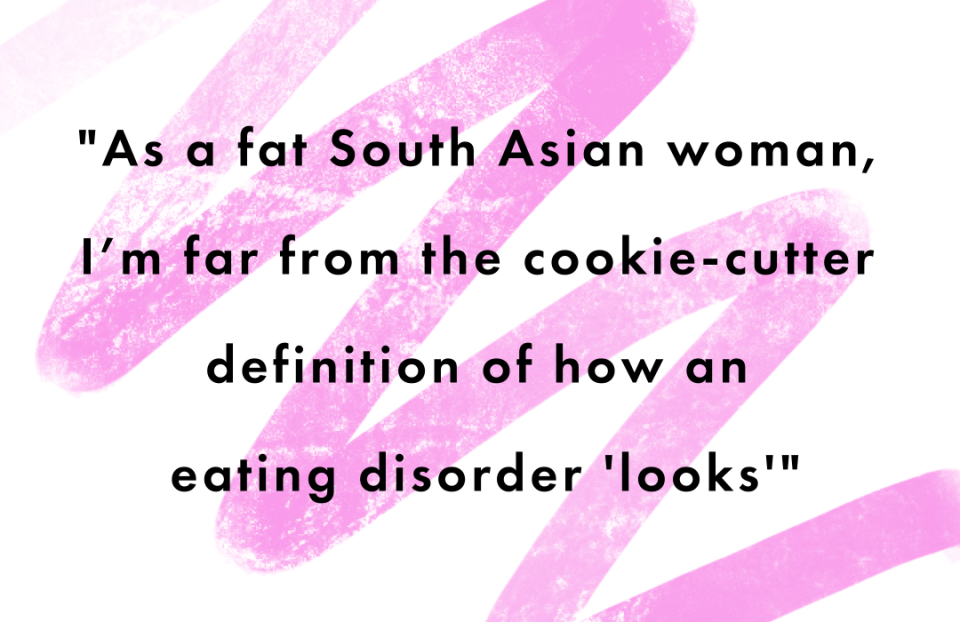Why are women of colour more likely to be hospitalised with an eating disorder?

“I’m afraid you should prepare for the worst. There’s a strong chance Millie’s heart will fail at some point in the next two weeks,” a doctor told 16-year-old Millie Sansoye and her parents, who were perched on the end of her hospital bed. Millie’s heart didn’t fail, but she spent 10 traumatic days on bed rest in hospital. “My parents were shell-shocked but I didn’t care whether I lived or died because mentally, I was suffering so much,” Millie, now 27, tells me. “It was only watching my mum, who never cries, sitting on my bed sobbing for half an hour straight that spurred me to fight for my life.”
At 15, losing weight became Millie’s life mission. She began counting calories, restricting food and exercising obsessively. “It got to the point where I’d feel guilty for eating an apple,” she says. “That’s when I realised, I needed help.”
Millie, who is of South Asian heritage, had been undergoing counselling for severe depression from the age of 14, so decided to broach the subject with her white female therapist. She was told she couldn’t have anorexia as her weight wasn’t low enough. “Her response made me feel like I had to lose even more weight. So, I did.”
Consequently, Millie's eating disorder worsened over the next few months – “If I ate even one calorie over my ‘allowance’, I would want to harm myself” – and it was only when she was at rock bottom and Millie's weight was low enough that Child and Mental Health Services intervened. “They told me that I could either go to hospital voluntarily or I’d be sectioned.”
Sadly, Millie’s story reflects the reality for many women of colour with eating disorders. Unsettling statistics show there has been a sharp rise in the number of people from ethnic minorities being admitted to hospital for these illnesses. Between 2017 and 2020, eating disorder admissions rose by 53% among ethnic minorities, with the sharpest rise for people from a Black African background at a staggering 216%. This suggests they aren’t receiving timely enough treatment and are ending up in hospital as a result, says Dr Agnes Ayton, chairwoman of the eating disorders faculty at the Royal College of Psychiatrists.
Consistent evidence proves early intervention plays a huge role in success rates of treating an eating disorder. “Eating disorders can get worse the longer they are left, so it is vital they are spotted early, and treatment begins as soon as possible,” says Rebecca Willgress, head of communications at BEAT, the UK’s leading eating disorder charity. So why aren’t Black, Asian and minority ethnic (BAME) women in particular accessing help until they reach crisis point?
What does an eating disorder
sufferer 'look' like?
One major barrier for women of colour is the prevailing stereotype that eating disorders are a thin white woman’s affliction. A 2019 YouGov poll found that 39% of people in the UK thought eating disorders were more common in white people. However, several studies prove that this is a misconception and that these illnesses are just as common, if not more so, among minority groups.
Even more worryingly, a study published in the International Journal of Eating Disorders found that among a group of 1,700 young people with eating disorder symptoms, those who didn’t meet the SWAG (skinny, white, affluent girl) stereotype were significantly less likely to have received a diagnosis or treatment in the past 12 months.
Looking back, Millie feels this may have delayed her diagnosis. “I didn’t fit into the anorexic ideal and it was clear from the demographic in the mental health unit that brown people’s mental health isn’t taken seriously.”
Reduced recognition of eating disorders among Black, Asian and minority ethnic women by healthcare professionals means their illnesses are more likely to fly under the radar, explains Dr Natalie Kanakam, a clinical psychologist at the Maudsley Hospital.

This rings true with 26-year-old Nikita’s experience. She developed Binge Eating Disorder (BED) at 14 but didn’t access help until she was 24. “As a fat South Asian woman, I’m so far from the cookie-cutter definition of what an eating disorder looks like,” she says. “Because of my weight, I had countless appointments with doctors and dieticians throughout my teens,” she explains. “But not one of them looked at me and considered I might have an eating disorder even though in hindsight it was very clear I had issues with food.”
Despite being one of the most prevalent eating disorders in the UK, BED is underdiagnosed, in part, due to weight stigma and stereotypes. For women of colour like Nikita, race is an additional barrier to accessing treatment. “I had doctors tell me that South Asians were predisposed to certain body types and I was often asked what my other family members looked like,” she tells me. “I feel as though they overlooked my mental state because they made assumptions about me and my weight gain based on my skin colour.”
After struggling alone for almost 10 years, it was only when, by chance, Nikita stumbled on the Anti Diet Riot Club's Instagram page and started learning about diet culture that she realised she had BED and sought professional help. But for Nikita, going to the GP wasn’t an option. “Given my past experiences, I didn’t trust them to listen or to help me so I went private.” According to Dr Kanakam, The SWAG stereotype may also discourage women of colour from seeking help as “they might think that services are not meant for them.”
This was certainly the case for Nikita. “I had no idea I had an eating disorder because every TV show I watched and every book I read about eating disorders was always about a skinny white girl with anorexia or bulimia,” she shares. “Because of the complete lack of representation, I didn’t think they were something that could affect me so I didn’t seek help for years.”
Stereotypes, shame and stigma
Stereotyping and bias aside, cultural stigma and shame around mental illness and eating disorders in Black, Asian and minority ethnic communities also prevent women from coming forward.
20-year-old Chelsea*, who is recovering from bulimia, suffered in silence for almost three years because she felt her Ghanaian parents wouldn’t understand. It was only when a concerned friend raised the issue with Chelsea’s mum that the family was forced to address it. “My dad literally told me to ‘snap out of it’ and my mum insisted it must be a stomach condition because she couldn’t accept I had a mental illness,” she tells me. “These things aren’t spoken about in their culture so I think they were confused and a bit scared.”

Like Chelsea, Millie also experienced harmful comments from family members. “When my grandmother visited me in hospital, she said to me, ‘Stop making all this up. We get it, you just want attention’,” she describes. “Fortunately, my mum took me seriously but so many of my South Asian friends didn’t get help because they couldn’t approach their families.”
Dr Kanakam says more must be done to raise awareness that eating disorders can affect anyone, regardless of race, and normalise seeking help for these illnesses. “Campaigns should include information about how and where to get support and give attention to early warning signs so families know when to get help,” she advises.
Nikita agrees with this suggestion, adding that healthcare professionals should provide safe spaces for women of colour to come forward without any repercussions. Meanwhile, Millie believes healthcare providers, who lack “cultural awareness and sensitivity”, must get better at recognising as well as dealing with the specific issues faced by women of colour.
“Most of the staff in the hospital were white and it definitely affected my treatment because they didn’t understand cultural differences or the specific pressures I faced as a South Asian girl,” she says. “Seemingly little things like the type of food they gave me and making me eat dinner really early, which isn’t the norm in Asian communities, as well as some of my family dynamics.”
To tackle this, Dr Kanakam suggests people from ethnic minorities who have had eating disorders could be included in developing training for medical professionals, schools and universities. “Giving these professionals more information about the symptoms and behaviours that are common in BAME women with eating disorders could help support referrals,” she explains.
According to Dr Kanakam, women of colour are more likely to minimise their problems and are less likely to express discontent with their body shape. “This may prevent doctors from suspecting an eating disorder, even if a patient displays other symptoms such as amenorrhea [the absence of menstruation], food restriction or being underweight,” she explains.
But as the majority of research on eating disorders has been carried out on white female patients in Western countries, Dr Kanakam argues more research into how these illnesses affect women from ethnic minorities is vital.
Unfortunately, coronavirus has had a detrimental impact on access to eating disorder treatment, making early intervention even harder. But Dr Kanakam warns that we cannot keep failing these women. “As we emerge from the restrictions of life under COVID, new approaches will be needed to make sure women of colour, who never reach services or only reach services at crisis point, get the timely help they need.”
Reflecting on her life-threatening battle with anorexia, Millie feels frustrated that it stole two years of her life, but is thankful she was able to make a full recovery. “I want any woman of colour who is suffering to know that there is a life beyond her illness and she has a bright future ahead of her, even if it doesn’t seem like it right now,” she says. “Please don’t let anyone dismiss what’s going on. Your eating disorder is valid and you deserve to get help.”
*Name has been changed
Beat is the UK's leading charity dedicated to helping people with eating disorders. If you or someone you know is struggling and want to seek help, call their helpline on 0808 801 0677 or visit their website for more information.
You Might Also Like


